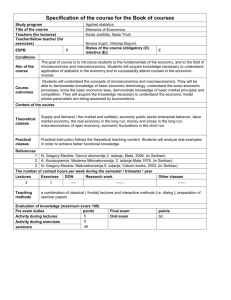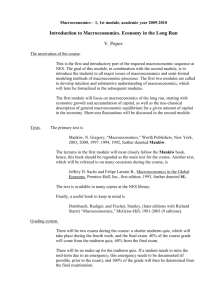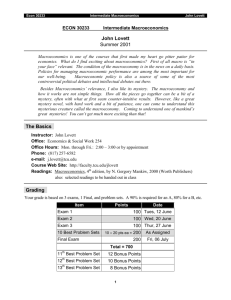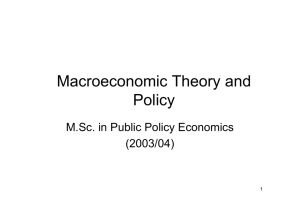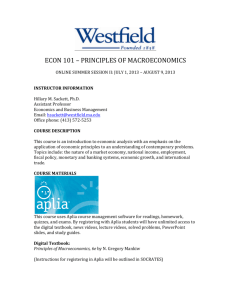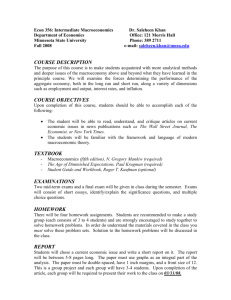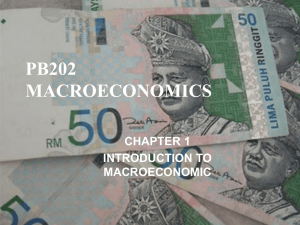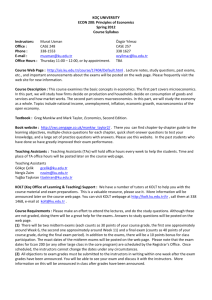ECON 100.001 and ECON 100.002 Principles of Macroeconomics
advertisement
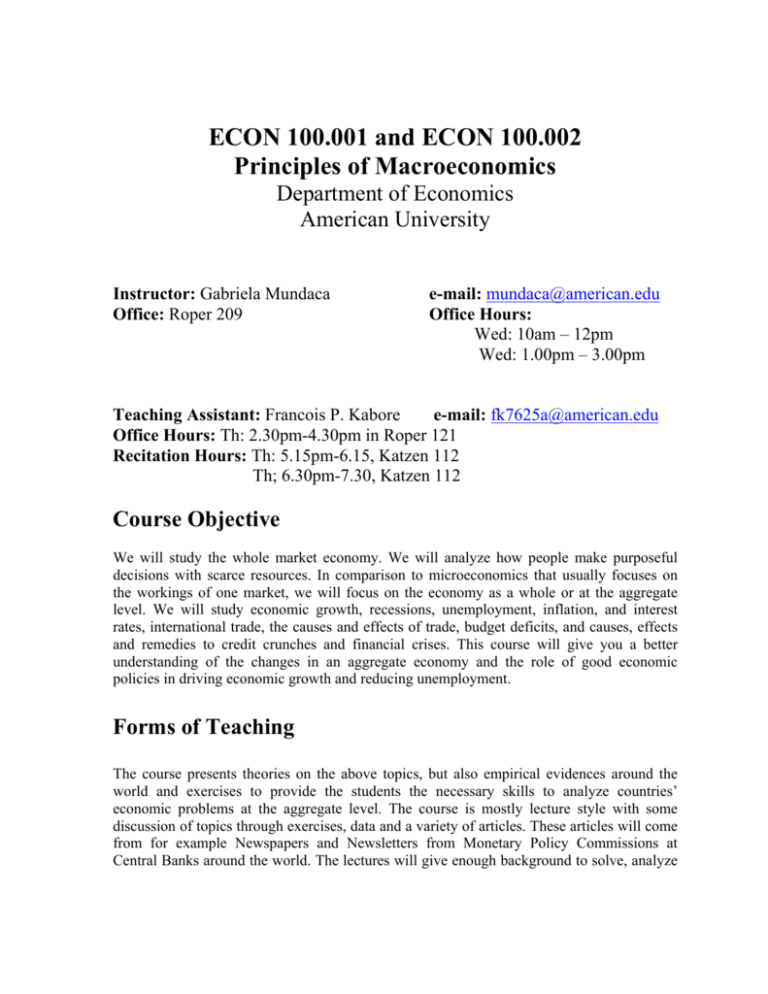
ECON 100.001 and ECON 100.002 Principles of Macroeconomics Department of Economics American University Instructor: Gabriela Mundaca Office: Roper 209 e-mail: mundaca@american.edu Office Hours: Wed: 10am – 12pm Wed: 1.00pm – 3.00pm Teaching Assistant: Francois P. Kabore e-mail: fk7625a@american.edu Office Hours: Th: 2.30pm-4.30pm in Roper 121 Recitation Hours: Th: 5.15pm-6.15, Katzen 112 Th; 6.30pm-7.30, Katzen 112 Course Objective We will study the whole market economy. We will analyze how people make purposeful decisions with scarce resources. In comparison to microeconomics that usually focuses on the workings of one market, we will focus on the economy as a whole or at the aggregate level. We will study economic growth, recessions, unemployment, inflation, and interest rates, international trade, the causes and effects of trade, budget deficits, and causes, effects and remedies to credit crunches and financial crises. This course will give you a better understanding of the changes in an aggregate economy and the role of good economic policies in driving economic growth and reducing unemployment. Forms of Teaching The course presents theories on the above topics, but also empirical evidences around the world and exercises to provide the students the necessary skills to analyze countries’ economic problems at the aggregate level. The course is mostly lecture style with some discussion of topics through exercises, data and a variety of articles. These articles will come from for example Newspapers and Newsletters from Monetary Policy Commissions at Central Banks around the world. The lectures will give enough background to solve, analyze -2- and evaluate the problems sets, the different issues discussed in Newspapers, and in general, macroeconomic problems of real life. The lectures, links to most of the required articles (to read) and problem sets will be available at AU “Blackboard”. Make sure that you check regularly the “Blackboard”. Announcements will be published there as well. To get the best of the course, it is suggested that you attend classes and the TA’s recitation as much as possible, and read the required book and readings and the lectures notes regularly as all of them are foundations for future lectures. Lecture’s notes are for supporting and not for substituting the reading material including the text book. Try as much as possible to practice the exercises given in the text book. Grading The students will be responsible for four closed-book exams: 3 midterms and one final, and four homeworks. The lowest midterm exam grade will be dropped. Each exam will make 25% of the total grade. The homeworks are due at the beginning of the class. Late homeworks will not be accepted. To have you homework graded, you need to present your work neatly, clearly label each problem and give sufficient explanation and interpretation of your results. The final grade will be based upon the following criteria: Class participation (5%) Homeworks (20%) Exams 75% Constructive class participation, and attending class and TA recitations (at least 8 recitations) will be all evaluated by the instructor over the term and used in borderline cases to determined the final grade. Exams and homeworks require analytical work and not just memorization of topics or models. Course Materials Required book: “Principles of Macroeconomics” by N. Gregory Mankiw, 5th edition, South-Western Cengage Learning. The core materials for the course consist of the above book, articles from Newspapers and Central Banks, and lecture notes. Make sure to have read all the corresponding materials, not least the problem sets, before you take the exams. -3- I strongly recommend to all students to read often: • • • • • The New York Times Washington Post. The Wall Street Journal The Financial Times The Economist I will publish in the website of the course a file called Link that will contain relevant links to important institutions, books, data relevant to the course. South-Western Cengage Learning provides a website, which accompany your textbook. There you will find practice exercises, quizzes to test your understanding of the course material. Exam Policy Exams are closed books and comprehensive. Absences from exams are allowed only for validated medical reasons. Unexcused absences from exams will result in a zero score in the calculation of the final grade. All exams will be administrated in strict observance of the University Honor Code, without compromise or exception. Course Program 1. Introduction. Basic Definitions in Economics. How Economists think. Gains from Trading: Week 1: January 13th and 16th. Chapters 1, 2 and 3 in “Principles of Macroeconomics” by N. Gregory Mankiw 2. The Market. Demand and Supply Weeks 2 and 3: January 23rd and 27th. Chapter 4 in “Principles of Macroeconomics” by N. Gregory Mankiw HOMEWORK #1: Due Thursday, January 29th. 3. Measuring a National Income Week 3: January 30th. Chapter 10 in “Principles of Macroeconomics” by N. Gregory Mankiw -4- ========================================================== MIDTERM #1: Tuesday, February 3rd ========================================================== 4. Measuring the Cost of Living Week 4: February 6th. Chapter 11 in “Principles of Macroeconomics” by N. Gregory Mankiw 5. Production and Growth Week 5: February 10th and February 13th. Chapter 12 in “Principles of Macroeconomics” by N. Gregory Mankiw 6. Saving, Investment, and the Financial System. Week 6: February 17th Chapters 13 in “Principles of Macroeconomics” by N. Gregory Mankiw HOMEWORK # 2: Due Friday, February 17th. ================================================== MIDTERN # 2: TUESDAY, FEBRUARY 20TH. ============================================================ 7. The Monetary System Week 7: February 24th and 27th Chapters16 in “Principles of Macroeconomics” by N. Gregory Mankiw 8. Unemployment. Money Growth and Inflation Week 8: March 3rd and 6th Chapters 15 and 17 in “Principles of Macroeconomics” by N. Gregory Mankiw HOMEWORK # 3: Due Friday, March 6th. MIDTERM # 3: Tuesday, March 17th. =============================================================== -5- 9. Aggregate Demand and Aggregate Supply Weeks 10 and 11th: March 20th and March 24th Chapter 20 in “Principles of Macroeconomics” by N. Gregory Mankiw 10. Monetary and Fiscal Policy Weeks 11th and 12th: March 27th and 31st Chapter 21 in “Principles of Macroeconomics” by N. Gregory Mankiw 11. The short-run trade-off between inflation and unemployment Weeks 12th and 13th: April 3rd and April 7th Chapter 22 in “Principles of Macroeconomics” by N. Gregory Mankiw 12. The Macroeconomics of Open Economics Weeks 13th and 14th: April 10th, 14th and 17th Chapters 18 and 19 in “Principles of Macroeconomics” by N. Gregory Mankiw 13. Basic tools of finance. Financial Crises Week 15th: April 21st and 24th Chapters14 in “Principles of Macroeconomics” by N. Gregory Mankiw AND LECTURE NOTES on Financial Crises. 14. Short revision of the course April 28th HOMEWORK # 4: Due Tuesday, April 28th FINAL EXAM: May 1st This syllabus may be subject to changes, i.e. we may take either longer or shorter time to finish a topic or I may need to change my office hours. If any change occurs, it will be posted in the Webpage of the course and/or announced in class. You are responsible of becoming aware of those announced changes.
